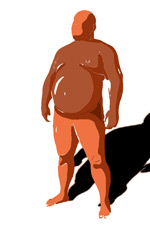 Within psychological intervention programs on obesity, nowadays the ones that are considered to be most effective, combined with medical care, are cognitive-behavioral treatments (CBT). The CBT suggest that it is essential to achieve behaviour change, re-learn to eat and expend energy in a balanced way.
Obesity is closely related to eating disorders, especially to Binge Eating Disorder and Bulimia. When preparing a treatment program for obesity, it is extremely important to assess and adapt the treatment in case there is some kind of food diagnosis in Axis I. The main objective of the CBT for the treatment of Eating Disorders is: a) to restore normal eating patterns; b) to restore normal weight (Anorexia); c) to treat physical complications; d) to correct thoughts; e) feelings and disfunctional beliefs about body image; f) to correct any problems on behavioural control and affection; g) to improve psychological difficulties; h) to obtain family support, and i) relapse prevention. | ||||
|
||||

 With this objective, we can include components which aim is to promote changes in behavior, cognitive and emotional patterns, whose basic goal is to change eating habits and the physical activity level. The guidelines that have proven to be more useful are the following: self-register as a means of self-evaluation and control (intake and physical activity), stimulus control, psychoeducation, cognitive techniques to change dysfunctional thoughts and attitudes, relationships and attitudes, relationships and relapse prevention.
With this objective, we can include components which aim is to promote changes in behavior, cognitive and emotional patterns, whose basic goal is to change eating habits and the physical activity level. The guidelines that have proven to be more useful are the following: self-register as a means of self-evaluation and control (intake and physical activity), stimulus control, psychoeducation, cognitive techniques to change dysfunctional thoughts and attitudes, relationships and attitudes, relationships and relapse prevention.